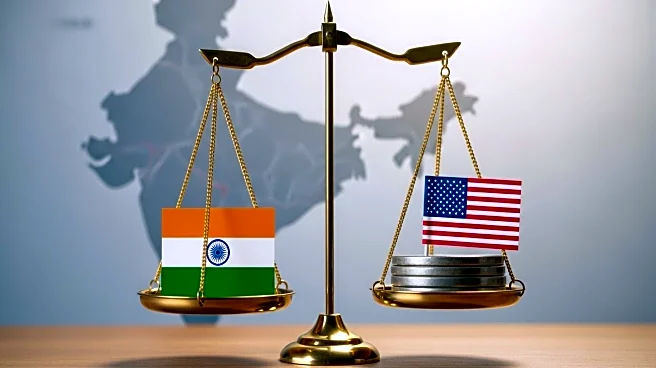What is the story about?
What's Happening?
The Trump administration has doubled tariffs on Indian-origin goods entering the United States to 50%. This move is part of a broader strategy to penalize India for its significant imports of Russian crude oil, which the U.S. claims is funding the Kremlin's war efforts in Ukraine. The tariffs are expected to impact labor-intensive sectors such as textiles, gemstones, jewelry, seafood, and automobiles. Despite exemptions for Indian medicines and electronics, U.S. businesses and consumers purchasing products like shrimp, clothes, and spices from India will face higher costs. The U.S. is a major importer of Indian oil products, with imports worth approximately $1.4 billion between January and July 2025, primarily from the Reliance Industries refinery, which sources nearly half its crude oil from Russia.
Why It's Important?
The imposition of tariffs by the Trump administration could strain U.S.-India trade relations, which have been historically significant. India is the largest export market for the U.S., and the increased tariffs could lead to higher prices for American consumers and businesses relying on Indian goods. The move also highlights geopolitical tensions, as India has been seen as a strategic partner against China. The tariffs could undermine goodwill built over decades between the two nations, potentially affecting future diplomatic and economic collaborations. Additionally, the tariffs may influence India's oil import strategies, as it navigates between economic benefits and geopolitical pressures.
What's Next?
India may seek to negotiate with the U.S. to reduce the tariffs or find alternative markets for its goods. The tariffs could also prompt India to reassess its oil import strategy, potentially reducing reliance on Russian crude. The situation may lead to diplomatic discussions aimed at resolving trade tensions and maintaining strategic partnerships. Furthermore, the tariffs could impact ongoing trade negotiations between the U.S. and India, particularly concerning India's agricultural and dairy sectors.
Beyond the Headlines
The tariffs could have broader implications for global trade dynamics, as other countries may reconsider their trade relationships with Russia and the U.S. The situation also raises ethical questions about the use of economic sanctions as a tool for geopolitical influence, particularly in the context of international conflicts. Long-term shifts in trade policies and alliances may emerge as countries navigate the complexities of global supply chains and political pressures.















